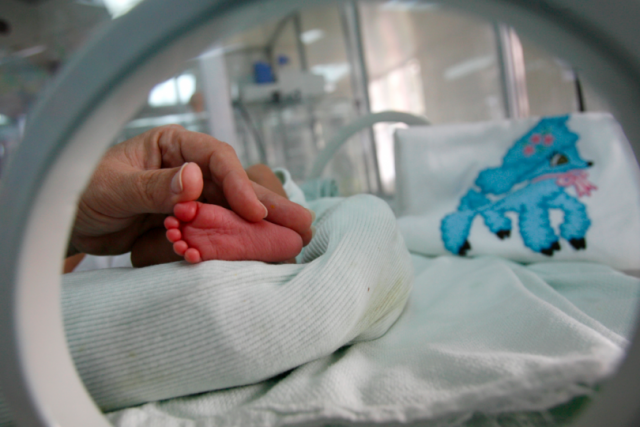Two out of every 1,000 children are born with clubfoot
It can be completely cured and that too without a surgery, if the child receives treatment at an early stage.

PHOTO: REUTERS
According to the medical experts clubfoot is a common deformity of the food present at birth which affects congenital or a birth defect in which one foot or both feet of a newly born child are twisted inwards from the ankle.
It is a painful condition that makes movement of the foot very uncomfortable. It can be completely cured and that too without a surgery, if the child receives treatment at an early stage.
The experts pointed that more than 250,000 children across the world suffer from this birth defect. However, most of the cases are reported from the less developed countries and the children live a miserable life due to lack of treatment facilities and knowledge about treatment of a curable and reversible condition.
Improving women’s health: Call to introduce modern birth control medicines
The experts further pointed out that the Ponseti method of treating infants was nonsurgical, effective and cheap besides having a 95% success rate than any other programme practiced in the world.
Prof Javed Iqbal, the first paediatric orthopedic surgeon of Pakistan and known for establishing first paediatric orthopedic unit of the country at The Children’s Hospital Lahore, told The Express Tribune on Tuesday that actual cause of clubfoot was not known.
“If your child has clubfoot, it is not because of anything you did or did not do during pregnancy,” he said.
“During development, muscles and ligaments in the back and inside of the foot do not grow normally. As a result the bones and joints of feet are held in an abnormal position. The affected foot is slightly smaller than the normal foot and there is slight reduction in the size of calf muscles,” Prof Javed remarked.
“These differences do not cause any problem and are usually forgotten. An untreated clubfoot in the child may become a cause of crippling as well as unsightly feet. The important thing for parents to keep in mind is that with proper assessment and prompt treatment a children born with clubfeet can be successfully treated. They run and play as normal children and do not have any disability in future,” Prof Javed maintained.
Hepatitis-B: K-P set to launch ‘vaccination at birth’
“The treatment should start within few days of birth. The initial treatment consists of manipulation of the foot to achieve the best possible position and then holding the correction in a plaster cast. The plaster is applied above knee to base toes. The babies should not find it painful, however, they usually become upset and cry while plaster is being applied,” he said while explaining the treatment.
He said he worked as a professor and head of Paediatric Orthopaedic Department in The Children’s Hospital, Lahore for 17 years and he observed that apart from the shortage of the “paediatric orthopaedics, we also lack expertise in treatment of clubfoot”.
“There is no system of screening and detailed examination of the babies at the time of birth which in fact is the main cause of alarmingly surge in various diseases including the clubfoot among them.”
He said there was need for creating awareness to save newly born children from various deadly diseases especially club foot.
According to the detailed report titled “Born Too Soon” by the Global Action Report on Preterm Birth of WHO, every year, some 15 million babies in the world are born too early. More than 1 million of those babies die shortly after birth; countless others suffer some type of lifelong physical, neurological or educational disability, often at great cost to families and society; and Pakistan is eighth in the top 10 countries with the highest rate of preterm births.
Published in The Express Tribune, May 24th, 2017.



















COMMENTS
Comments are moderated and generally will be posted if they are on-topic and not abusive.
For more information, please see our Comments FAQ